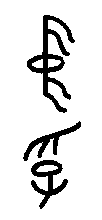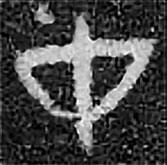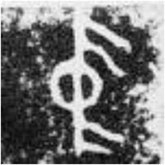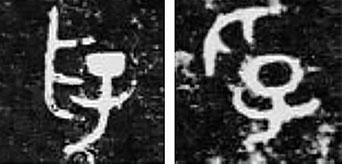I Ching, Yijing or Zhou Yi
"Oracle of the moon": © 2000 LiSe
 Yi Jing, Oracle of the Moon
Yi Jing, Oracle of the Moon

The image of hexagram 61
Zhōng Fú,
inner sincerity
What does it mean, 'inner' and 'outer trigram' (popup)
Duì below Xùn: people, animals or plants are what they are, they can be trusted to behave in their own way. The lion like a lion, the mouse like a mouse, the human like a human. It is the way of their character, inner truth means to be truthful to yourself. A true saint or a true cheater, both act according to their own inner truth. This inner truth is the basis of creativity.
But there is also the shared truth of the group, clan, pack or species. Their laws and instincts, habits and beliefs. Inner and shared truth often clash, but both are indispensable. Without individual truths both society and individuals would petrify, without common truths people would destroy each other.
See Shenshu 242, which is a rather harsh image of hex.61.

Ideogram of the hexagram name: the first character is zhong, a picture of a drum, mounted on a pole with banners. The second character is fu, a picture of a hand above a child. Its general meaning is to grasp or hold something. Inspire confidence: 'grasping an audience'.


 Zhong, center, is a very common character, written innumerable times, which causes many different forms, with and without banners. It also means middle or halfway.
Zhong, center, is a very common character, written innumerable times, which causes many different forms, with and without banners. It also means middle or halfway.

Two versions of 'fu' old meaning: incubation, "hatch". Later: trust, believe, inspire confidence in sb., to be convinced, capture, conform, credit, prestige, reputation.
The 'Great Image' says: Winds over the Lake: inner sincerity. The noble one discusses criminal cases in order to delay executions.
(Like a 'crime passionel' is punished less severely than a premeditated one)
Hex.61 is the contrast of 62, where one pays care to one's actions.
Hex.61 is when one's nature expresses itself as it is.
Hex.61 is 'inverse' to itself.
Hex. 61 is about being and showing your true colors. Not about some ideal truth. Do not believe what someone says he/she is, or thinks he is. But when he is in real danger, then one can see his real nature. Truth shows most of all when all human things are gone, on the edge of life. Or in smaller ways: a little greed can be enough to make someone show what he/she is really made of. And when someone has absolute power, he also shows himself. There will be no punishment, so he lets go all restrictions. Few are those who still have ethics when they are mighty.
When you meet someone who stays honorable in such circumstances, you know this is a person who can be trusted. You can build on the true kernel.

